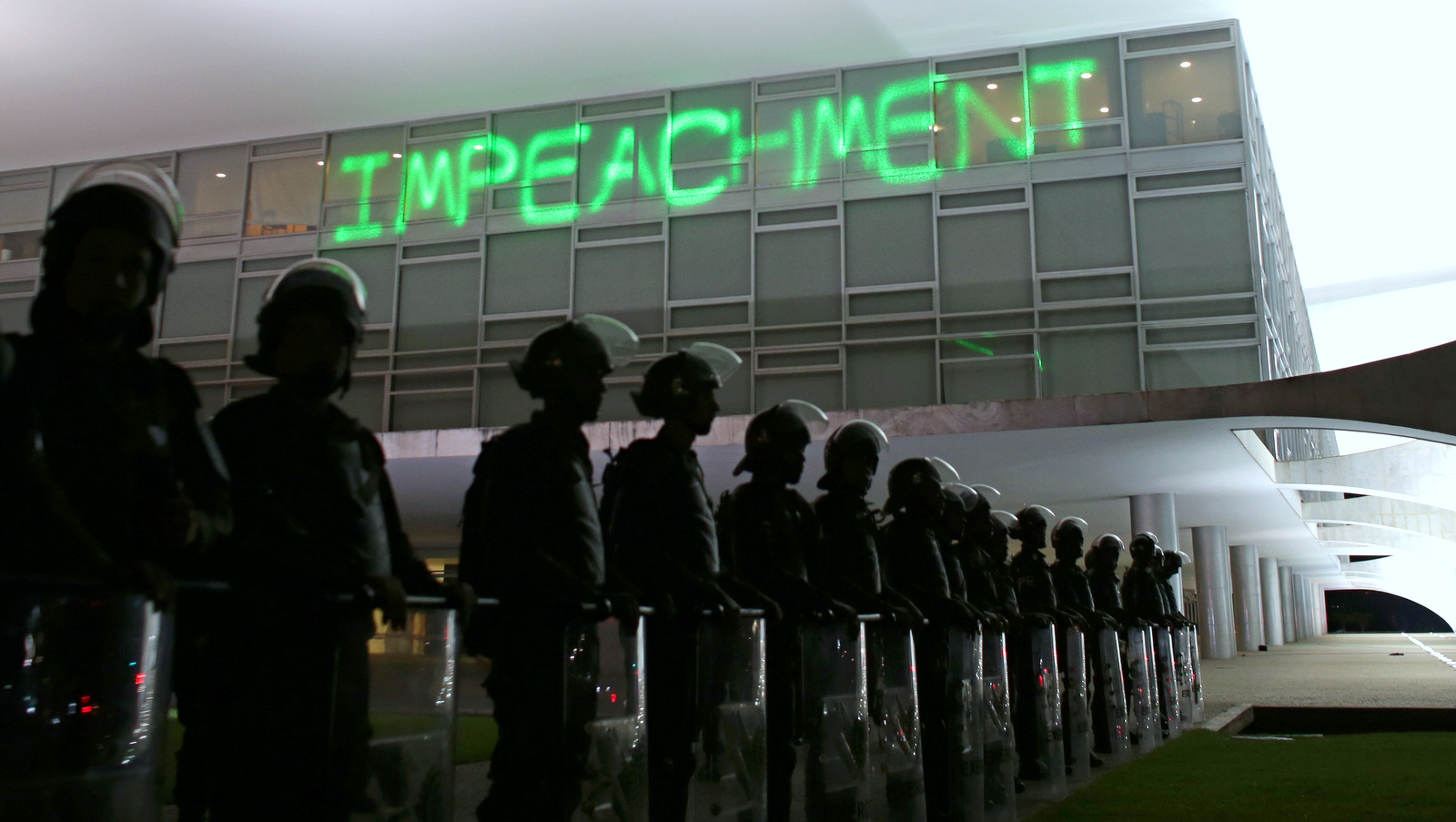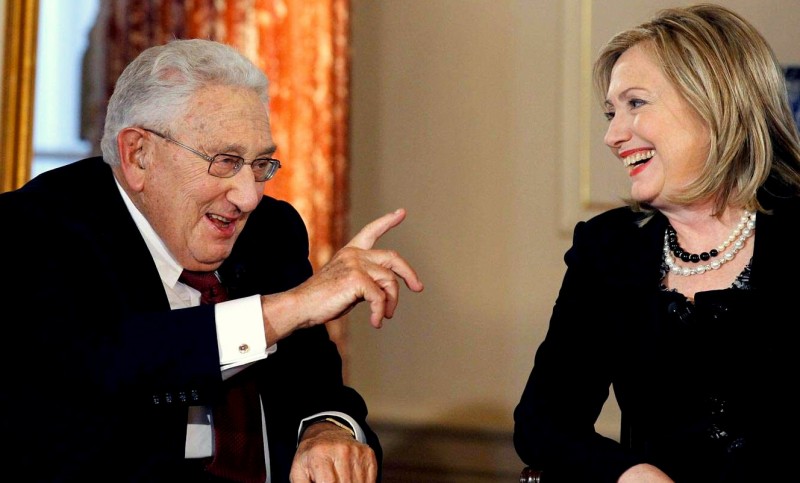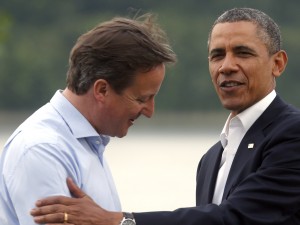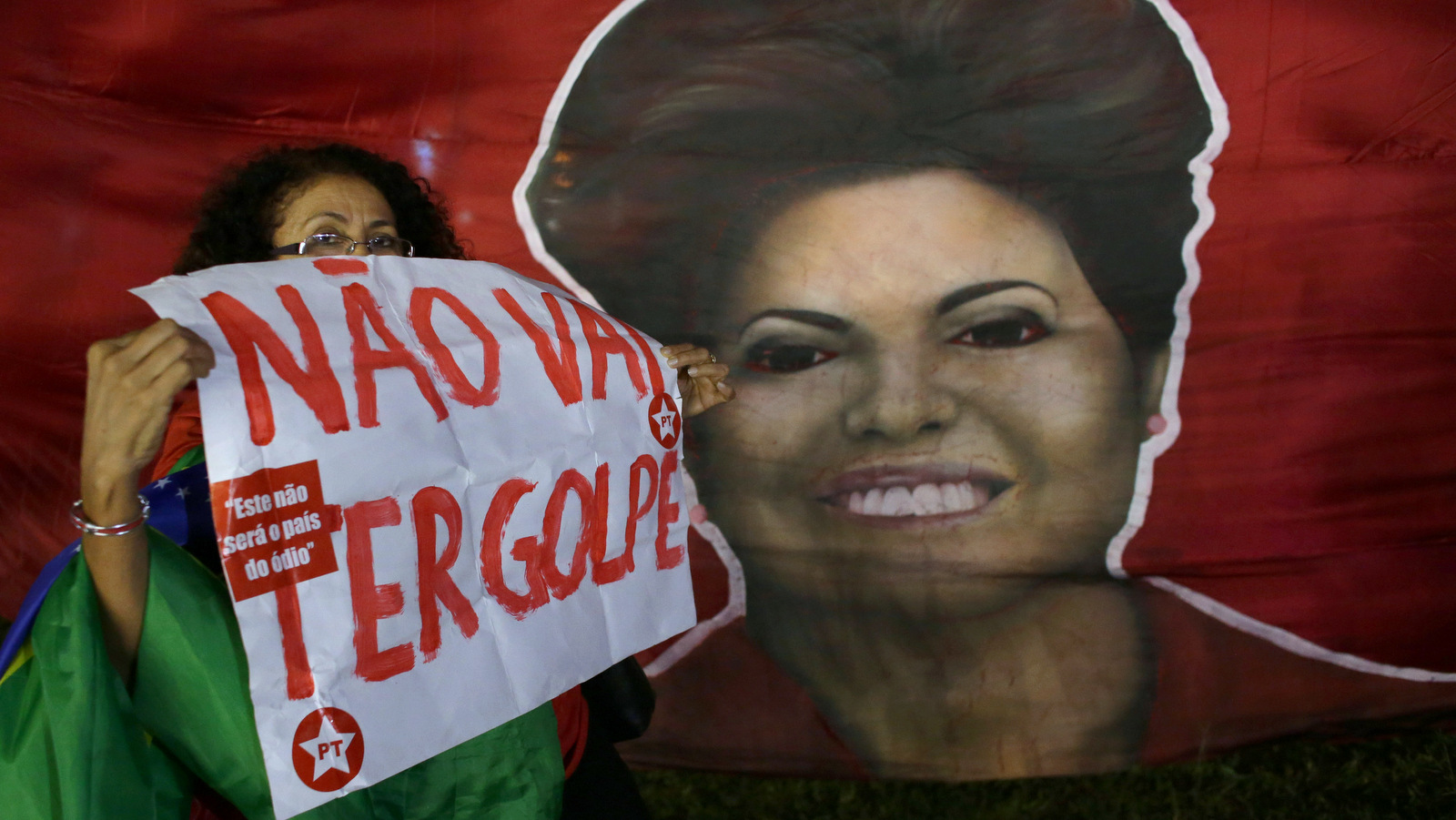Despite all the fancy anti-corruption rhetoric, the assault on President Rousseff’s leftist government is the result of a coordinated campaign by business interests tied to Washington and Wall Street.
 Soldiers stand guard outside Planalto presidential palace where protesters have projected the word “Impeachment” on the building, as they call for the impeachment of Brazil’s President Dilma Rousseff in Brasilia, Brazil, Monday, March 21, 2016. (AP/Eraldo Peres)
Soldiers stand guard outside Planalto presidential palace where protesters have projected the word “Impeachment” on the building, as they call for the impeachment of Brazil’s President Dilma Rousseff in Brasilia, Brazil, Monday, March 21, 2016. (AP/Eraldo Peres)
NEW YORK — (Analysis) The last decade has seen a remarkable coalescing of non-Western nations in both economic and political partnerships. These multilateral institutions have been championed as alternatives to Western organs of political and economic power such as NATO, the International Monetary Fund, and the World Bank.
From the growth of the Shanghai Cooperation Organization to the establishment of the Eurasian Economic Union, China’s “One Belt, One Road” strategy to link much of the Eurasian landmass via trade and investment, and most recently the establishment of the Asian Infrastructure Investment Bank, many have viewed these developments as essential for the decentralization of global power away from the imperial centers of Washington, Wall Street, London and Brussels.
But perhaps none of the emerging Global South international groupings has been more promising in terms of both public relations and real economic partnership than that of the BRICS countries (Brazil, Russia, India, China and South Africa).
BRICS countries account for 46 percent of the world’s population – over 3 billion people, as of 2015 – making it the single largest bloc in terms of human capacity among global alliances. The scope of BRICS, combined with its increasing assertiveness as an economic power unto itself, has undoubtedly ruffled a few feathers in Washington and elsewhere in the West.
It should come as no surprise that major moves have been taken in the last 12 to 24 months to undermine each BRICS member nation and destabilize them through political and economic means. And it is no coincidence that those leaders shown smiling and shaking hands at recent BRICS summits are now either the targets of destabilization efforts and subversion – as in the cases of Brazil, Russia, China and South Africa – or are a target of a military and political charm offensive, as in the case of India. In each case, the United States and its allies benefit significantly from the latest developments.
Brazil in the crosshairs
One of the U.S. empire’s tried and true methods of destabilizing a targeted country is through manufacturing and promoting political scandals and/or political movements that appear oppositional but whose interests, whether consciously or not, align with the ruling establishment in the West. Both of these elements are at play in Brazil, which has been moving toward increased economic, and consequently political, independence in recent years.
Aw oman shows poster written in Portuguese “There will not be a coup” next to a picture of Brazil’s President Dilma Rousseff, during a rally in her support and of former President Luiz Inacio Lula da Silva, in Brasilia, Brazil, Friday, March 18, 2016. Silva has been targeted in an alleged corruption investigation involving the Brazil oil giant Petrobras. (AP/Eraldo Peres)
In Brazil, the government of Dilma Rousseff is facing a major destabilization campaign orchestrated by powerful right-wing elements in the country and their U.S. backers. Under the always convenient banner of “anti-corruption,” millions have turned out in the streets to demand the ouster of the twice-elected Rousseff government on the heels of a series of revelations about alleged corruption pertaining to the quasi-state, quasi-private Petrobras oil company.
According to the allegations, a number of leading political figures, some of whom are connected to President Rousseff and the Workers’ Party, have skimmed at least 3 percent of the billions in oil revenue from Petrobras, illustrating the still active tradition of corruption in Brazil.
The latest target is former President Lula da Silva, who was forcibly removed from his home in an ostentatious show of force by law enforcement authorities meant to humiliate the 70-year-old founder of the Workers’ Party. Because of his working class background, the former president was seen as the hope and pride of the left in Brazil, and the public removal from his home earlier this month sparked the latest round of protests.
But what — or who — is really behind the soft coup in Brazil?
The right wing is the driving force of the protests, despite any progressive-minded, anti-corruption sentiment being expressed by various segments of the protest movement. Two of the principal groups responsible for organizing and mobilizing the demonstrations are the
Free Brazil Movement (MBL) and
Students for Liberty (EPL), both of which have
direct ties to Charles and David Koch, the right-wing, neocon, U.S. billionaires, as well as other leading figures of the far right, pro-business neoliberal establishment.
MBL is fronted by Fabio Ostermann and Juliano Torres, both of whom were educated in the Atlas Leadership Academy, a satellite of the Atlas Economic Research Foundation, which is
directly funded by the Koch brothers. EPL is a direct affiliate of the U.S.-based Students for Liberty, a well-known Koch brothers outfit with deep ties to the right-wing political establishment in the U.S.
One of the leading faces of the movement is Kim Kataguiri, a 20-year-old “activist,” who is both a founder of MBL and a leader in EPL. Unabashedly pro-big business, he’s an adherent of the so-called Austrian School of Economics, the economic ideology that advocates total deregulation of the economy in the interests of private business, and a great admirer of Milton Friedman, the father of what is known today as neoliberal capitalism.
Kataguiri and his fellow right-wing activists have been quick to distance themselves from the blood-soaked legacy of right-wing coups in Brazil and Latin America for obvious reasons. Yet they espouse precisely the same economic policies as those enacted throughout the region, perhaps most famously in Chile under the brutal dictatorship of Augusto Pinochet, whose economic policies were directly guided by none other than Friedman.

In this March 18, 2015 photo, anti-government protest leader Kim Kataguiri poses for a picture in Sao Paulo, Brazil. (AP/Andre Penner)
“We defend free markets, lower taxes and the privatisation of all public companies. … In Brazil, the left is still seen as cool by young people. … We want to destroy this idea that if you defend free markets then you’re an old man who is asking for a dictatorship. … Unfortunately, we don’t have any big sponsors. The government and some sectors of the press say that we are financed by rich people. We would have no problem in being financed by rich people.”
Unfortunately for Kataguiri, Ostermann, Torres and their colleagues, the truth about their connections to powerful finance capital and business in the U.S. and throughout Latin America is well known. Still, the corporate media whitewashes these connections, presenting the protests as some sort of pure expression of people’s discontent, rather than a manufactured form of political manipulation and destabilization which has seized upon difficult economic times to cynically exploit public opinion. Brazil’s economic downturn over the past two years has made this much easier.
Other influential groups such as VemPraRua (“Come to the Streets”) are directly funded by powerful right-wing business interests inside the country, including Brazil’s richest man, Jorge Paulo Lemann. As Bloombergnoted in a 2013 profile of Lemann:
“In the U.S., Lemann is virtually unknown, even though he and his two longtime partners, Marcel Herrmann Telles and Carlos Alberto Sicupira, now control three icons of U.S. consumer culture: Heinz ketchup, Burger King, and, after the $52 billion takeover of Anheuser-Busch in 2008, Budweiser beer. The combined market value of the companies they run is $187 billion—larger than that of Citigroup.
In Brazil, Lemann is a business-class hero. … Worth some $20 billion, Lemann is No. 32 on the Bloomberg Billionaires Index, seven slots behind George Soros and three ahead of Carl Icahn.”
Meanwhile, the reactionary, pro-U.S. elements inside (and outside) Brazil are particularly angered at the Workers’ Party and, more broadly, the left. This is not because of corruption – though corruption undoubtedly remains a problem – but because of the ascendance to power of political forces representing working class and poor Brazilians.
Bringing BRICS to heel
In short, despite all the fancy anti-corruption rhetoric, the assault on Rousseff’s leftist government is the result of a coordinated campaign by business interests tied to the U.S. Washington and Wall Street that see in Brazil a dangerous precedent in which a left-wing government sympathetic to and allied with Bolivarian movements in Venezuela, Bolivia, Ecuador, and until recently, Argentina, was able to gain power and preside over an economic boom.

A graph demonstrating the correlation between expansion of anti-government sentiment and the stagnation of GDP growth.
Indeed, this point should not be understated — namely, the economic downturn in commodities such as oil which has put the brakes on Brazil’s rapid economic progress.
In fact, recent data shows that the expansion of anti-government sentiment directly correlates to the stagnation of GDP growth, which itself directly correlates to the decline in commodities prices. As many have convincingly argued, the collapse of oil has no doubt been fomented and encouraged, if not directly orchestrated, by the U.S. and its allies in the Gulf in order to target non-Western countries whose economies are tied to oil and gas revenue — Venezuela, Bolivia, Brazil, and especially Russia. Essentially, what’s unfolding in Brazil is a multi-pronged effort to destabilize the country via a variety of political and economic means, with the ultimate goal of bringing to heel a key member of BRICS. But it is not the only one.
Brazil is certainly not the only BRICS member facing an offensive by the U.S.-NATO system. The next article in this series will examine the destabilizing forces reaching into South Africa. Future pieces will examine the growing military relationship between the U.S. and India, as well as the multi-faceted strategies to contain, isolate, and destabilize Russia and China.















